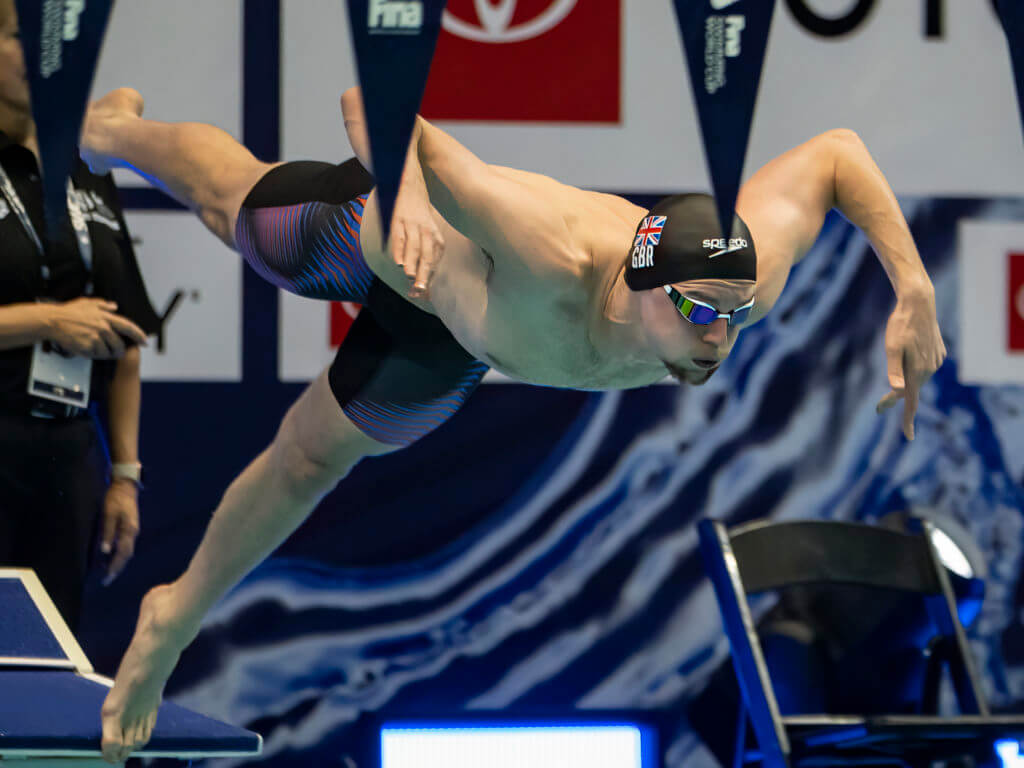World Championships Preview — Men’s Relays: Great Britain, Italy Seeking More Wins Against Established Nations (Predictions)

Editorial content for the 2023 World Aquatics Championships is sponsored by FINIS, a longtime partner of Swimming World and leading innovator of suits, goggles and equipment. World Championships Preview — Men’s Relays: Great Britain, Italy Seeking More Wins Against Established Nations Eight years ago, Great Britain first broke through as a true global contender in men’s relays, knocking off the five-time defending champion Americans to win an 800 freestyle relay crown. More titles followed, with another 800 free relay win in 2017, a shocking come-from-behind 400 medley win in 2019 and a pair of gold medals at the Olympics in the men’s 800 free and mixed 400 medley. After a down year in 2022, the British team is still missing the engine that powers the men’s (and mixed) medley relay, Adam Peaty, but the nation’s freestyle depth has lifted the Brits into contention in the 400 free relay as well as the 800. Meanwhile, Italy has emerged more recently, first winning 400 free relay silver and 400 medley relay bronze at the Tokyo Olympics before upgrading to gold in the men’s medley last year with a win over the United States. Can Italy, Great Britain or any other upstarts win titles in Fukuoka? Can Australia factor in and score first a World Championships relay gold after winning only three since 2003? The typically-dominant Americans have plenty of talent but also some missing pieces. Previous Events: The United States owns a winning streak in the 400 free relay dating back to the 2016 Olympics. The only swimmer on each of those relays? Caeleb Dressel, who will not be competing in Fukuoka after a long layoff from swimming. In his absence, the Americans assembled a lineup with plenty of speed, including five men under 48 so far this year, but without much experience standout. The veteran of the group is Ryan Held, a member of the top American lineup at the 2016 Olympics and at last year’s Worlds but not in between. Held swam a time of 47.63 in prelims at U.S. Nationals, but he was slower in the final. Still, the U.S. coaches will surely rely on Held plenty given his experience. Justin Ress, sixth at Nationals, swam on last year’s finals relay, while the other four men are all new to international racing: Jack Alexy, Destin Lasco, Matt King and Chris Guiliano. The primary competition, at least based on times from 2023, looks to be an Australian team led by 2016 Olympic champion Kyle Chalmers and teenage standout Flynn Southam, while Great Britain enters the fray in this event based on the efforts of Matt Richards and Lewis Burras. Here are the best composite relays these countries can put together based on 2023 times only: United States: Ryan Held 47.63 + Jack Alexy 47.75 + Destin Lasco 47.87 + Matt King 47.93 = 3:11.18 Those numbers would suggest a slight advantage for the United States but not a comfortable one, certainly considering the relative lack of experience among the group. But we must also consider the longer-term track records of these swimmers, and when adding in times posted over the previous two years as well, it becomes clear how the track records of the Australian and British swimmers stands out. Additionally, this new analysis puts Italy into the mix after two consecutive major meets reaching the podium in this event. This next composite analysis includes best times going back to January 1, 2021, and note that with Dressel and Brooks Curry not qualified for Worlds and Zach Apple retired, the American foursome is the same as above. Great Britain: Lewis Burras 47.63 + Matt Richards 47.72 + Tom Dean 47.83 + Duncan Scott 47.87 = 3:11.05 Yes, that’s four countries separated by a meager half-second. This does not account for relay starts, and several of these men have a history of performing extremely well on relays: Dean, Held and Chalmers all split 46s at last year’s Worlds while Frigo, seemingly the weak leg out of Italy’s group anchored the country’s bronze-medal relay last year in 47.65. So this is going to be an absolute barnburner, with the winner coming down to who shows up in the moment. Prediction: Gold: United States Call it a hunch that the U.S. group comes through here. Held gives the Americans the lead on the leadoff leg, and Alexy comes home in 47-low to secure it. The Americans are the deepest group, and two prelims standouts return for finals to post big splits. The British team needs all four men firing at full speed to have a chance at gold here. Australia is in fourth place before Chalmers enters the water and makes up ground at the end. This relay should be far more straightforward than the 400 freestyle, with Great Britain and the United States squaring off for gold. The British team of Tom Dean, James Guy, Matt Richards and Duncan Scott dominated the Olympic final in 2021, finishing only three hundredths off the long-standing world record on the way to gold. But one year later, with Scott out of Worlds after a bout with COVID-19 and Richards unable to recapture his Olympic form, the United States dominated the race in the World Championships final. It was the Americans’ first gold in this race since Michael Phelps and Ryan Lochte last raced for the Stars and Stripes at the 2016 Olympics. This time, Britain has its full-strength roster back while five different American men swam 1:45s at U.S. Nationals. There has been significant turnover in the U.S. men’s sprint corps, but the 200 free group includes Kieran Smith, Drew Kibler and Carson Foster returning from last year’s gold-medal relay while Luke Hobson has emerged as a force, winning the 200 free at U.S. Nationals in a time of 1:45.18 after a dominant season on the college level. The composite relays based on season-best times look like this, with the clear No. 3 team in the world (Australia) well behind the top two: Great Britain: Matt Richards 1:44.83 + Tom Dean 1:44.93 + James Guy 1:45.85 + Duncan Scott 1:45.90 = 7:01.51 That’s a half-second difference, 0.1% of a race that will take about seven minutes, possibly less as both countries could challenge the 14-year-old world record. Looking at both groups, it’s clear that each swimmer on both teams has more in the tank for Fukuoka. If times from several years back are considered, Britain’s roster would include both Dean (1:44.22) and Scott (1:44.26) with their times from their gold-silver finish in the 200 free Olympic final, and both men have also split 1:43s on relays in the past. However, the Americans also have more in the tank, with Smith holding a best time of 1:44.74 and Kibler having been as fast as 1:45.01 in his fourth-place finish in last year’s Worlds final. Prediction: Gold: Great Britain Flip the order of finish from the 400 free relay as the British men have the experience needed to get it done here. Again, not much confidence in the pick, but the X-factor here is Scott swimming close to his career-best level. At the conclusion of last year’s World Championships, Italy earned a relay gold medal for the first time ever at a World Championships. The team included a pair of individual 100-meter world champions on the front half, backstroker Thomas Ceccon and breaststroker Nicolo Martinenghi, and the back half of Federico Burdisso and Alessandro Miressi held on, denying the United States by less than three tenths. That same foursome is likely to return to the forefront in Fukuoka, and the chance of a repeat gold is very real. The biggest competition, once again, will come from the Americans, also returning a similar lineup to last year. Ryan Murphy or Hunter Armstrong will handle backstroke after both men joined Ceccon on the 100 back podium last year, and the consistent Nic Fink will likely swim breaststroke. Ryan Held is the most likely anchor, but the American coaching staff will pick a top 100 freestyler from several choices based on results during the meet. That leaves butterfly, a perceived U.S. weakness last year. Caeleb Dressel had held down the fly leg every year since Michael Phelps retired, but without Dressel’s usual 49 was missing for the medley following his mid-meet withdrawal. Michael Andrew delivered a critical 50.06 split in the 2022 relay final to give the Americans a chance going into the last 100, but Andrew did not qualify for Worlds this year. Neither did Dressel, and Shaine Casas did not come close to his 50.40 100 fly form from last year. Early on at U.S. Nationals, with Dressel, Casas and Andrew all struggling, it looked like butterfly would remain a concern, but Dare Rose filled the void admirably as he won the event in 50.74, which ranks him third in the world entering Worlds. The Americans once again hold an advantage on that stroke over every competitor but one. Here is the composite analysis based mostly on 2023 top times. Few Italians have recorded times close to their best this year, so for this composite, we will feature season-best times from last year. Also included in this analysis will be France, Australia and Great Britain. Italy: Thomas Ceccon 51.60 + Nicolo Martinenghi 58.26 + Federico Burdisso 51.39 + Alessandro Miressi 47.45 = 3:28.70 This shows a small difference between the Americans and Italians, and it could go either way. However, Italy’s last two legs are somewhat questionable, with neither Burdisso or Miressi having approached those times in a while, so if the Americans are within a half-second at the halfway point, you have to like their chances. Meanwhile, of the remaining competitors on the list, most have some glaring weaknesses: Britain’s backstroke leg remains a problem, and while James Wilby is an accomplished breaststroker, he does not match up to the greatness of Adam Peaty. Australia has a great back-half but similar front-half shortcomings. France, meanwhile, has a real opportunity to win a medal here, with Mewen Tomac breaking 53 in the 100 back earlier this year and Florent Manaudou posting a quick enough 100 free to allow Maxime Grousset to move to butterfly. If that happens, Leon Marchand can swim breaststroke. Marchand has not raced any 100-meter events in recent years, but he recorded the fastest-ever 50 and 100-yard breaststroke splits earlier this year at the NCAA Championships, and his 2:06.59 200 breast time ranks first in the world. The 58.50 time above is simply a guess, but if he can achieve that, watch out for a French team with no major weaknesses. Prediction: Gold: United States Just like last year, Italy leads early on, but the butterfly leg is the deciding factor as Rose surges ahead for the Americans.

Men’s 400 Freestyle Relay
WR
3:08.24
United States (M. Phelps, G. Weber-Gale, C. Jones, J. Lezak)
Beijing (CHN)
Aug. 11, 2008
CR
3:09.06
United States (C. Dressel, B. Pieroni, Z. Apple, N. Adrian)
Gwangju (KOR)
July 21, 2019
Australia: Kyle Chalmers 47.44 + Flynn Southam 47.77 + Jack Cartwright 48.21 + Kai Taylor 48.41 = 3:11.83
Great Britain: Matt Richards 47.72 + Lewis Burras 47.99 + Duncan Scott 48.00 + Tom Dean 48.32 = 3:12.03
Australia: Kyle Chalmers 47.08 + Flynn Southam 47.77 + Matt Temple 48.07 + Jack Cartwright 48.21 = 3:11.13
United States: Ryan Held 47.63 + Jack Alexy 47.75 + Destin Lasco 47.87 + Matt King 47.93 = 3:11.18
Italy: Alessandro Miressi 47.45 + Thomas Ceccon 47.71 + Lorenzo Zazzeri 47.96 + Manuel Frigo 48.50 = 3:11.62
Silver: Great Britain
Bronze: Australia
Men’s 800 Freestyle Relay
WR
6:58.55
United States (M. Phelps, R. Berens, D. Walters, R. Lochte)
Rome (ITA)
July 31, 2009
CR
6:58.55
United States (M. Phelps, R. Berens, D. Walters, R. Lochte)
Rome (ITA)
July 31, 2009
United States: Luke Hobson 1:45.12 + Kieran Smith 1:45.63 + Carson Foster 1:45.64 + Drew Kibler 1:45.67 = 7:02.06
Australia: Kai Taylor 1:46.25 + Alexander Graham 1:46.68 + Thomas Neill 1:46.82 + Elijah Winnington 1:46.85 = 7:06.42
Silver: United States
Bronze: Australia
Men’s 400 Medley Relay
WR
3:26.78
United States (R. Murphy, M. Andrew, C. Dressel, Z. Apple)
Tokyo (JPN)
Aug. 1, 2021
CR
3:27.28
United States (A. Peirsol, E. Shanteau, M. Phelps, D. Walters)
Rome (ITA)
Aug. 2, 2009
United States: Hunter Armstrong 52.33 + Nic Fink 58.36 + Dare Rose 50.74 + Ryan Held 47.63 = 3:29.06
France: Mewen Tomac 52.87 + Leon Marchand 58.50 + Maxime Grousset 50.61 + Florent Manaudou 48.12 = 3:30.10
Australia: Isaac Cooper 53.46 + Zac Stubblety-Cook 59.68 + Matt Temple 51.35 + Kyle Chalmers 47.44 = 3:31.93
Great Britain: Oliver Morgan 53.92 + James Wilby 59.25 + Jacob Peters 51.16 + Matt Richards 47.72 = 3:32.05
Silver: Italy
Bronze: France




